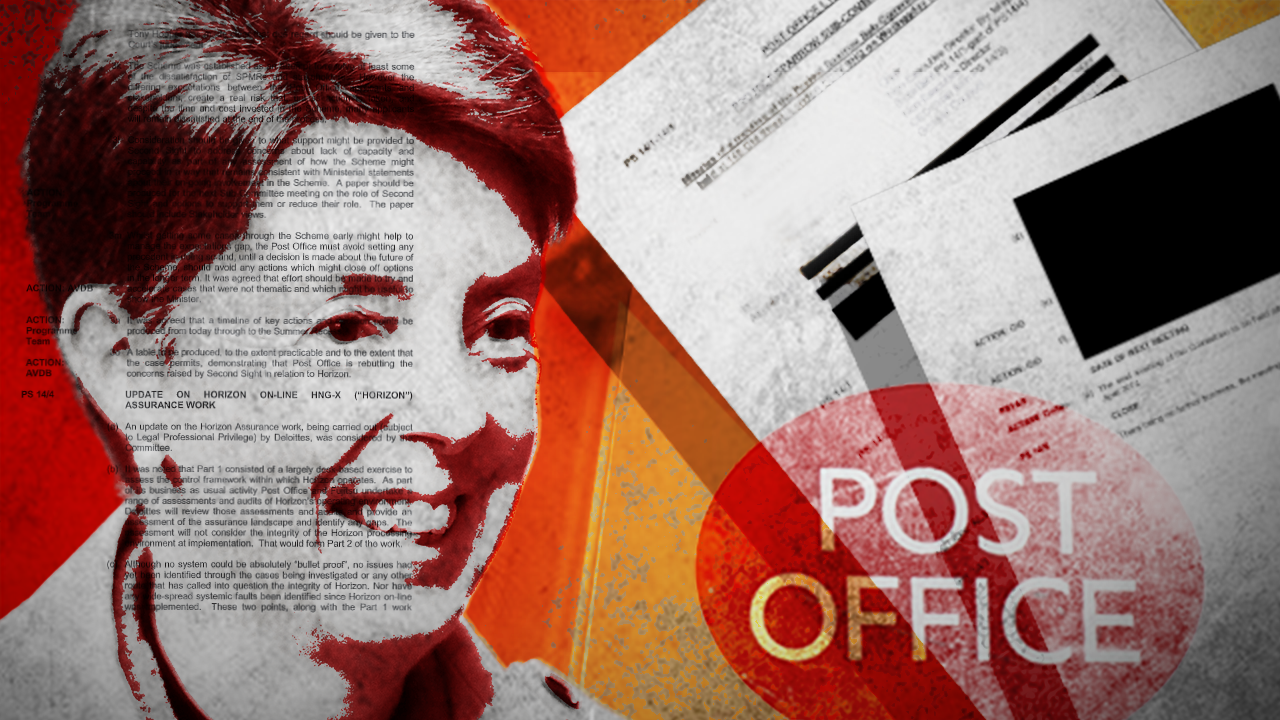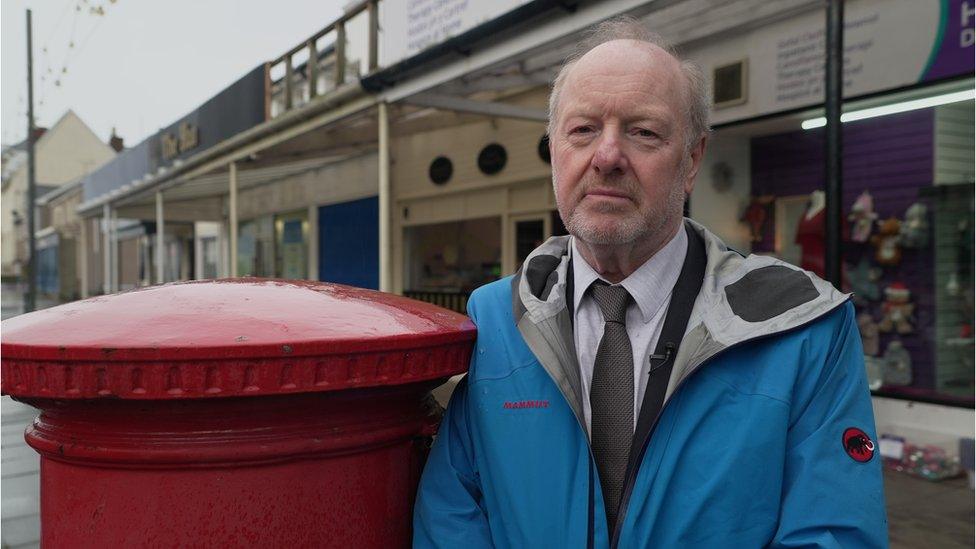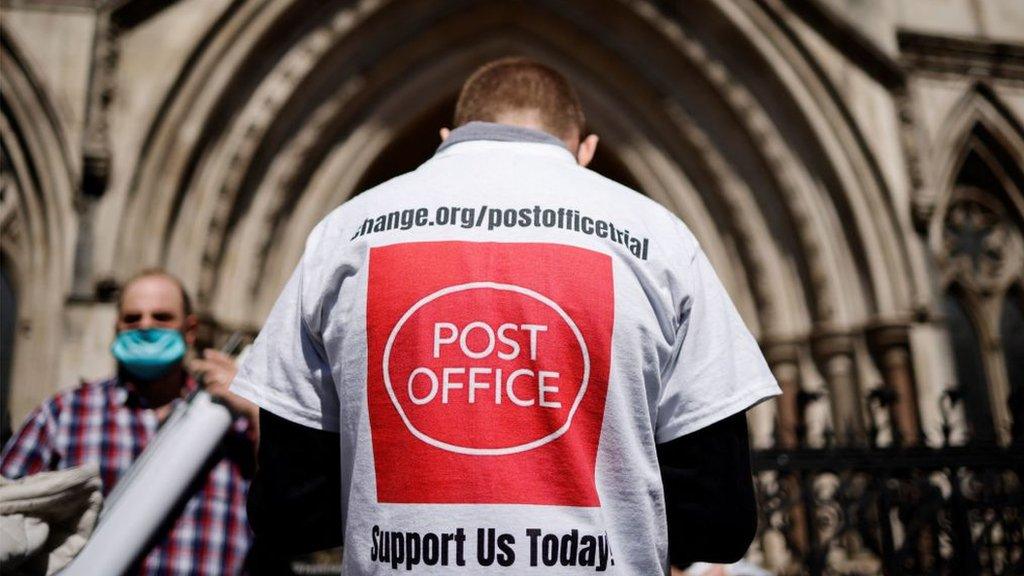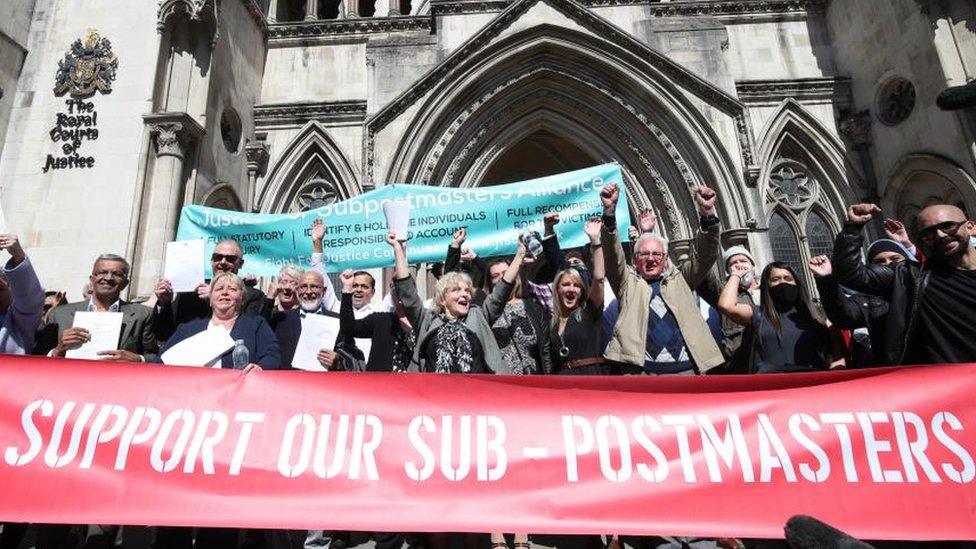Post Office accused of cover-up over secret Horizon documents
- Published

Post Office bosses secretly decided in April 2014 to sack forensic accountants who had found bugs in their IT system, documents obtained by the BBC show.
They also reveal the government had knowledge of the decision, taken by a Post Office board sub-committee, codenamed "Project Sparrow".
Former sub-postmaster Alan Bates said it was further proof of a "total cover-up".
The Post Office said it would be inappropriate to comment.
Downing Street said it was taking the reports "extremely seriously".
The independent forensic accountants Second Sight played a key role in exposing the scandal, finding flaws in the Horizon computer system which generated false evidence of cash shortfalls at sub-post offices, leading to wrongful prosecutions of sub-postmasters.
Post Office bosses kept insisting their systems were robust.
But they made a concession following pressure from MPs, offering to set up a mediation scheme to deal with what they said was a small number of cases.
The documents reveal the Post Office planned to pay a total of only £1m in "token payments", or compensation, to sub-postmasters as it suppressed evidence of computer bugs in 2014.
But it was a vast underestimation of the eventual cost of the scandal, which is now expected to be more than £1bn.
Details of the Project Sparrow discussions were not disclosed in evidence to sub-postmasters as they challenged the Post Office through the courts in 2017-2019.
"It's been a cover-up from start to finish," said Alan Bates. "That's coming out now. It's undeniable.
"And this is what we've been up against all the way. We've always known they were covering up - it's just been very difficult to find proof," he added.
The secret plan to sack Second Sight is revealed in the minutes of two Project Sparrow meetings in April 2014.
The minutes were released in heavily redacted form in 2021 after former Post Office chief executive Paula Vennells disclosed the existence of Project Sparrow.
Now the BBC has obtained the unredacted minutes, showing what the Post Office didn't want the public to see.

Project Sparrow
The Project Sparrow sub-committee was led by Post Office chair Alice Perkins and included chief executive Paula Vennells, alongside the Post Office's most senior internal lawyer, general counsel Chris Aujard, and Richard Callard, a senior civil servant at UK Government Investments, then a division of the Department for Business, Energy and Industrial Strategy.
The unredacted minutes for 9 April 2014 show the sub-committee asking for a paper to be prepared on the role of Second Sight and "options to support them or reduce their role".
Three weeks later, on 30 April 2014, they agree on a plan to bring the investigation of sub-postmasters' cases "within the control of the Post Office", removing Second Sight from its role of investigating sub-postmasters' cases independently.
However, that decision was kept secret from Parliament and the public as the Post Office claimed Second Sight's independent review supported its approach to sub-postmasters' complaints. The Post Office was then seeking to defuse the scandal through a mediation scheme, which excluded many victims from compensation.
Your device may not support this visualisation
Bugs in the system
Nine months before the committee met, Second Sight submitted a report on 8 July 2013 identifying computer bugs that raised doubts over the reliability of Horizon data used to prosecute sub-postmasters.
A week later, on 15 July 2013, the Post Office was warned in formal advice written by its own lawyer Simon Clarke that it was in breach of its legal duties because sub-postmasters who had been prosecuted should have been told about the bugs.
The next day, 16 July 2013, the Post Office board expressed concern that Second Sight's review exposed the business to claims of wrongful convictions.
Yet the Project Sparrow minutes from April 2014 show Paula Vennells, Alice Perkins and the other members discussed closing or speeding up the mediation scheme and planning to pay minimal compensation to sub-postmasters.

Alan Bates says it's been "a cover-up from start to finish"
That followed advice from lawyers Linklaters that they had only "very limited liability in relation to financial redress".
The minutes show the committee asking for a paper to brief them on making "token payments" to sub-postmasters applying to the mediation scheme, trumpeted in public at the time by ministers as a solution to sub-postmasters' complaints.
"The cost of all cases in the scheme going to mediation would be in the region of £1m," the unredacted minutes state.
Members of the committee knew sub-postmasters wouldn't be happy and that there was a "real risk" that "many applicants will remain dissatisfied at the end of the process".
On 30 April 2014, following advice from Chris Aujard, the committee decided not to make any "ex gratia" payments - meaning payments to struggling sub-postmasters to help them while their cases were examined.
They also asked for a paper to be prepared on options for closing or speeding up the mediation scheme.
Second Sight's interim report in 2013 did say that it had found no systemic flaws in the Horizon system. But the word "systemic" had a specific meaning - that no flaws could be found in every single post office branch.
What the Post Office didn't say was that it also made an unwelcome finding, identifying incidents where defects or bugs in the Horizon software "gave rise to 76 branches being affected by incorrect balances or transactions which took some time to identify and correct".
On 17 December 2014, Jo Swinson, the former Liberal Democrat MP who served as Postal Affairs minister in the coalition government at the time, answered a parliamentary debate on the scandal. She pointed to the independent role of Second Sight.
The following year, in March 2015, as it prepared to submit its full report, 11 months after the decision had been taken, Second Sight's contract was terminated and the Post Office brought investigation of the sub-postmasters' cases in-house.
Lord Arbuthnot, a former MP and vocal critic of the handling of victims in this scandal told the BBC that the government has to take responsibility "for everything that went wrong" in relation to the sub-postmasters.
"It's a distinctly corrupt, murky story that goes right the way into government and it's deeply worrying," he said.
The prime minister's spokesperson said on Friday it was "right" that there was an inquiry ongoing and pointed out that the reports related to a previous administration.
"It is for the inquiry to establish culpability and to look at what lessons have to be learned. For the government's part we are co-operating and supporting the inquiry fully," the spokesperson added.
Alice Perkins and Paula Vennells didn't respond to requests for comment.
Linklaters also did not comment.
Chris Aujard and Richard Callard said through public relations advisers that they would not comment while the inquiry was ongoing.
UK Government Investments declined to comment.
Jo Swinson said: "The latest revelations about the Project Sparrow meetings and decisions show the extent of the cover-up by Post Office Ltd - they were kept secret from Parliament and the public, and from ministers too.
"Not only did the Post Office directors, including the government official, choose not to tell ministers, they instead briefed the opposite. Repeatedly they told me that Post Office Ltd had never seen anything that would undermine any of their prosecutions, something that we now know is simply not true."
A Post Office spokesperson said: "We never discuss individuals and it would be inappropriate to comment on allegations being made outside of the Inquiry, whose role it is to consider all of the evidence on the issues it is examining and independently reach conclusions.
"We fully share the Public Inquiry's aims to get to the truth of what happened in the past and accountability."

Are you affected by the issues raised in this story? Share your experiences by emailing haveyoursay@bbc.co.uk, external.
Please include a contact number if you are willing to speak to a BBC journalist. You can also get in touch in the following ways:
WhatsApp: +44 7756 165803
Tweet: @BBC_HaveYourSay, external
Please read our terms & conditions and privacy policy
If you are reading this page and can't see the form you will need to visit the mobile version of the BBC website to submit your question or comment or you can email us at HaveYourSay@bbc.co.uk, external. Please include your name, age and location with any submission.

